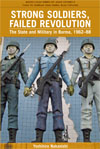This post is also available in: Japanese

Strong Soldiers, Failed Revolution: The State and Military in Burma, 1962-88.
Nakanishi, Yoshihiro. March, 2013.
Description
General Ne Win’s state reformation in the name of the “Burmese Way toSocialism” contributed to the expansion of the political role of the Myanmar Armed Forces, the tatmadaw, but the underlying dynamics of this change remain poorly understood. Drawing on propaganda publications, profi les of the country’s political elites, and original documents in Burma’s military archives, Yoshihiro Nakanishi offers a fresh look at the involvement of the tatmadaw in Burma’s ideological discourse and civil-military relations.
The tatmadaw ’s anti-communist propaganda during the 1950s was a key element in state ideology under the Ne Win regime, and the direct participation of tatmadaw offi cers in the Burma Socialist Programme Party and government ministries at the national and local level transformed the political party system and civilian bureaucracy. Personal relationships — between Ne Win and the tatmadaw offi cer corps, and within the military — were central to the growing infl uence of the military, and to the outcome of the political crisis and subsequent military coup d’état in 1988.
Nakanishi’s discussion of these processes reveals many heretofore-unknown facts about this “dark age” in the country’s political history, and highlights its institutional legacy for the post-1988 military regime and the reformist government that succeeded it. His thought-provoking conclusions are signifi cant for Southeast Asia specialists and for students of politics generally, and his insights will be useful for anyone seeking to engage with Myanmar as it comes to terms with an outside world it once kept at arm’s length.